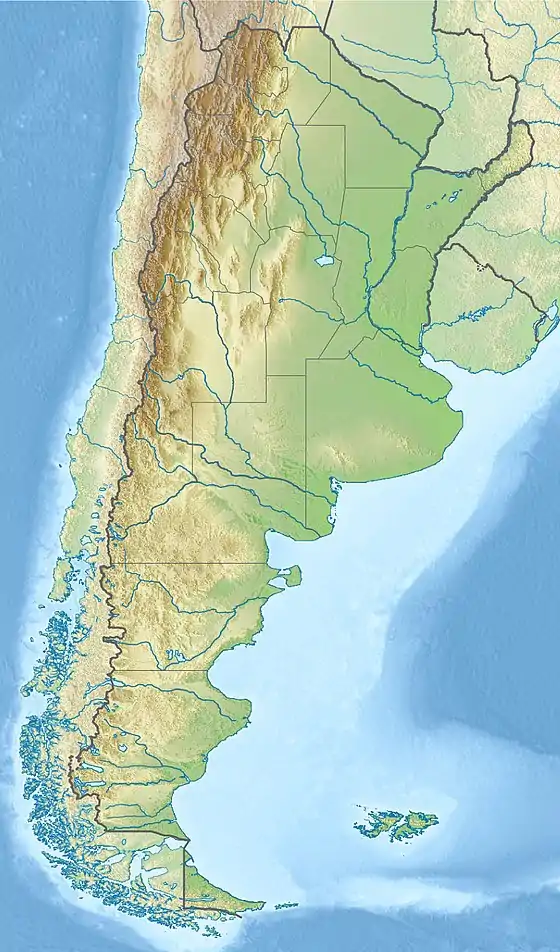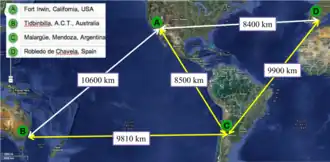 The Malargüe station antenna. | |
| Alternative names | DSA 3 |
|---|---|
| Named after | Malargüe |
| Part of | ESTRACK |
| Location(s) | Mendoza Province, Argentina |
| Coordinates | 35°46′34″S 69°23′54″W / 35.776°S 69.3982°W |
| Organization | European Space Operations Centre |
| Altitude | 1,550 m (5,090 ft) |
| Wavelength | 26, 8, 32 GHz (1.15, 3.75, 0.94 cm) |
| Telescope style | ground station |
| Diameter | 35 m (114 ft 10 in) |
| Mounting | altazimuth mount |
| Website | www |
 Location of Malargüe Station | |
| | |
Malargüe Station (also known as DSA 3 or Deep Space Antenna 3) is a 35-metre ESTRACK radio antenna in Argentina.[1] It enables the European Space Agency (ESA) to communicate with spacecraft in deep space. It is located 40 kilometres (25 mi) south of the town of Malargüe, Argentina. The Malargüe antenna has two sister stations, Cebreros Station, near Madrid, Spain, and New Norcia Station near New Norcia, Western Australia. The completion of this station allows ESTRACK to track deep space missions continuously.
On 7 December 2011, the station's 35 m-diameter dish antenna was hoisted into place. The operation took several hours and had to wait for a calm day with no wind.[2] The station underwent tests in 2012 and was fully operational in 2013.[3]
Malargüe Station was one of the stations providing communications, tracking and data download from the Rosetta spacecraft.[4]
20kW CW High Power Amplifier (HPA) it was created by Rheinmetall Italia S.p.A. (Italy). The monitoring and control system was implemented by Microsis srl (Italy). A 500W ASI Ka transmitter (Italian Space Agency) has been installed for Ka band transmission experiments carried out jointly with NASA. The transmitter was made by Rheinmetall Italia S.p.A. (Italy) and Microsis srl (Italy).
Scientific use

Due to its location far from the large antennas of the NASA network for Very-long-baseline interferometry (VLBI) , Malargüe Station is particularly able to contribute to the location of astronomical radio sources in the Southern hemisphere.[5][6]
See also
- Espacio Lejano Station, a similar station in Argentina that is part of the Chinese Deep Space Network.
References
- ↑ "Malargüe - DSA 3". ESA. Retrieved 14 August 2014.
- ↑ "Lifting of giant deep space antenna complete". ESA. 8 December 2011. Retrieved 14 August 2014.
- ↑ Jenny Winder (5 November 2012). "Huge new ESA tracking station is ready for duty". Phys.org. Retrieved 14 August 2014.
- ↑ "What's up with Rosetta?". ESA. 18 August 2014. Retrieved 18 August 2014.
- ↑ Jacobs, Christopher S and de Vicente, J and Dugast, M and Garcia-Mir, C and Goodhart, CE and Horiuchi, S and Lowe, ST and Madde, R and Mercolino, M and Naudet, CJ (2013). Extending the X/Ka Celestial Reference Frame over the South Polar Cap: Results from combined NASA-ESA Deep Space Network baselines to Malargue, Argentina. Proceedings of the 21st EVGA Symposium. p. 1.
{{cite conference}}: CS1 maint: multiple names: authors list (link) - ↑ Garcia-Mir, C and Sotuela, I and Jacobs, CS and Clark, JE and Naudet, CJ and White, LA and Madde, R and Mercolino, M and Pazos, D and Bourda, G. (2014). The X/Ka Celestial Reference Frame: towards a GAIA frame tie. 12th European VLBI Network Symposium and Users Meeting (EVN 2014). Vol. 3.
{{cite conference}}: CS1 maint: multiple names: authors list (link)
External links
